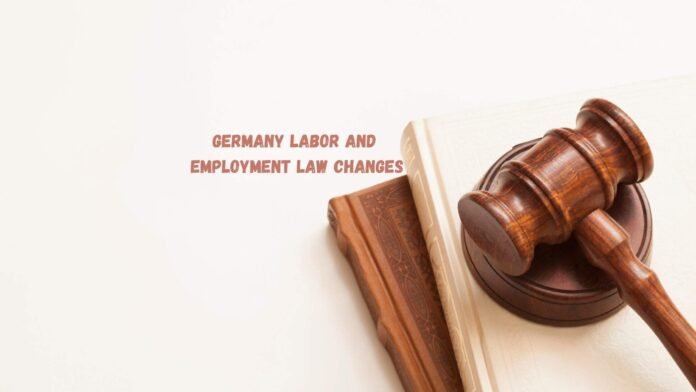Germany introduced significant changes to its labor and employment laws in 2025. These updates impact wages, employment contracts, severance payments, parental leave, and more. Understanding these regulations is crucial for employees and employers to ensure workplace compliance and fairness. Below is a detailed breakdown of the latest labour law reforms and their implications.
Minimum Wage Increase in 2025
The German minimum wage has increased to €12.82 per hour, effective January 1, 2025. This marks a modest yet essential raise from the previous rate of €12.41 per hour in 2024. The increase aims to help workers cope with rising inflation and living costs, particularly in urban areas where housing and daily expenses have surged. According to the Federal Statistical Office (Destatis), Germany’s inflation rate hovered around 3.4% in 2024, making wage adjustments necessary.
This change also affects mini-job workers, who now have an increased monthly earnings threshold of €556. Previously, the limit was €520, meaning mini-job employees could earn slightly more without affecting their tax-free status. For example, a student working a part-time mini-job will now have the flexibility to take on extra hours without exceeding the threshold that mandates full Social Security contributions.

While this increase benefits many low-wage workers, small businesses may struggle with higher payroll costs. Sectors like retail, hospitality, and cleaning services, which heavily rely on minimum-wage workers, might need to adjust their pricing structures to accommodate the wage hike.
Electronic Employment Contracts and Digital Signatures
Germany has taken a step toward digitalization by allowing electronic employment contracts under the Fourth Bureaucracy Relief Act (effective January 1, 2025). Employers can now issue essential employment contract terms digitally, provided the document remains accessible, savable, and printable. However, handwritten signatures are still required for fixed-term contracts and post-contractual non-compete agreements.
This reform significantly reduces administrative burdens for HR departments. Previously, German labor laws required printed contracts with physical signatures, leading to unnecessary paperwork. By enabling qualified electronic signatures, companies can streamline hiring processes, particularly in industries that rely on remote work and international talent. For instance, a Berlin-based tech startup that hires a developer from Spain can now complete the onboarding process entirely online.
Despite these advancements, some labor unions have expressed concerns about document tampering and unauthorized contract modifications. To mitigate such risks, companies must use secure digital signing platforms that comply with EU eIDAS regulations, ensuring authenticity and integrity.
Changes in Severance Payment Taxation

One of the most significant tax-related labor law changes in 2025 is eliminating the one-fifth rule for severance payments in payroll tax deduction procedures. Previously, severance packages were taxed at a reduced rate to ease the financial burden on dismissed employees. Under the new system, severance payments are taxed in full during payroll processing. However, affected employees can still claim tax reductions during their income tax assessment.
For example, if an employee in Munich received a severance package of €50,000 in 2024, the one-fifth rule would have taxed them as if they had earned an additional €10,000 annually over five years, resulting in lower overall taxation. This severance is taxed as a lump sum, which may result in higher immediate deductions.
This change primarily impacts high-earning professionals in industries prone to restructuring, such as finance, automotive, and pharmaceuticals. Employees facing layoffs should consider financial planning strategies, such as investing in pension schemes or negotiating severance packages that include deferred payments.
Parental Leave and Part-Time Work Adjustments
Starting May 1, 2025, employees in Germany can now apply for parental leave and request part-time work during parental leave via text format, such as email. Previously, applications had to be submitted in writing with a physical signature, often leading to delays in processing.
This change is particularly beneficial for new parents balancing work and childcare responsibilities. According to Germany’s Federal Ministry for Family Affairs, over 1.4 million parents took parental leave in 2024, with fathers accounting for 24% of the applicants. By simplifying the application process, the government aims to encourage greater participation from fathers in childcare.
For example, a software engineer in Hamburg who wants to take two months of parental leave can now email their HR department rather than submitting paperwork in person. This speeds up the approval process and reduces bureaucratic hurdles for employees and employers.
Equalization Levy Increase for Hiring Disabled Employees

Employers with at least 20 employees must ensure that 5% of their workforce comprises severely disabled individuals. If they fail to meet this quota, they are required to pay an increased compensatory levy based on the percentage of compliance:
- €155 per month for employment rates between 3% and 5%
- €275 per month for employment rates between 2% and 3%
- €405 per month for employment rates between 0% and 2%
- €815 per month for companies that employ no disabled workers
This measure aims to boost workplace inclusivity and ensure businesses contribute to social responsibility initiatives. Large companies, particularly in the manufacturing, logistics, and IT sectors, must revise their hiring policies to comply with the new requirements.
For example, a logistics firm in Frankfurt with 1,000 employees must employ at least 50 disabled workers or face annual penalties of up to €489,000. Employers who fail to comply should consider revising their recruitment strategies, offering workplace accommodations, and partnering with organizations that support disabled job seekers.
Short-Time Work Allowance Extension
Germany has extended the short-time work allowance (Kurzarbeit) to 24 months to combat economic uncertainty and potential job losses. This extension helps businesses facing temporary financial struggles by reducing employees’ working hours while the government partially covers lost wages.
This policy is particularly relevant in industries affected by economic downturns or supply chain disruptions, such as automotive manufacturing, tourism, and aviation. In 2020, during the COVID-19 pandemic, Kurzarbeit helped preserve 6 million jobs, preventing mass layoffs.
For instance, if a car manufacturer in Stuttgart experiences a decline in exports due to global supply chain issues, they can reduce working hours instead of laying off workers. Employees receive at least 60% of their net wages for lost hours, while those with children receive 67%.
Conclusion for Labor and Employment Law Changes
Germany’s labor and employment law updates for 2025 bring both opportunities and challenges for businesses and employees. While higher wages, digital employment contracts, and improved parental leave policies provide greater flexibility and fairness, severance taxation changes and increased employer levies require careful financial planning. Companies must adapt to these changes to remain compliant, while workers should stay informed to protect their rights.
Employers and employees can navigate Germany’s evolving labor landscape more effectively by staying updated on these laws. If you are unsure how these laws affect you, consult an HR professional or labor lawyer to ensure compliance with the latest regulations.

